A medical student resume is a document that outlines your educational background, experience, and skills.
It is used to apply for residency, fellowships, and other medical training programs. A resume is an important part of a medical student’s career. You will use the medical student resume when seeking employment outside the classroom.
Medical students need to have duties outside of their classroom work to feel like they are contributing members of society. A medical student will use a resume to earn employment and show employers what they have accomplished. A medical student can also use a resume to show potential employers that they are capable of doing the job before being hired. Your medical resume is one of the first things medical schools or hospitals will look at when considering you for admission, so it’s important to ensure it’s well written.
A medical student resume is a key tool that can help you stand out from your peers and make a strong impression in residency programs. Your resume should highlight your academic achievements, clinical experience, and extracurricular involvement. In addition, it should be well-written and tailored to the specific needs of residency programs. Creating a strong medical student resume is an important first step in your residency application process. By taking the time to come up with a well-written and informative resume, the chances of being accepted into the residency program of your choice increase.
This article has discussed everything you need to know about a medical student resume. The topics discussed include:
- The definition and importance of a medical student resume
- The format of a medical student’s resume
- What to include in the resume
- Some important tips on writing an effective medical student resume.
Right Format for a Medical Student Resume
When it comes to resumes, one format does not fit all. This is especially true for medical students, who often have to tailor their resumes to specific programs and positions. Having a medical resume that is well thought out, written, and formatted correctly is important. A reverse chronological format is the most appropriate format for a resume. A reverse chronological format lists relevant work experience in reverse order, starting with the most recent position.
Start by using a font that is easy to read can make it easier for employers to read and understand what your resume is about. You could use a font like times new roman 12, for example. Leave the margins on the resume by an inch. The one-inch rule is used in order for your resume to look more professional and appealing.
Remember to make sure that their resume is not longer than one page since lengthy resumes have a greater chance of being ignored. Additionally, add various resume sections such as the resume header, experience, skills, profile, and some additional sections.
What to Include in a Medical Student Resume
Creating a resume can be time-consuming when you are a medical student. However, it is important to have a well-crafted resume to submit with your residency and fellowship applications.
Below are elements that you should include in your resume to make it stand out:
Contact details
In the medical field, your contact details are important. Your resume should include your full name, email address, and phone number. You can include a link to your personal website or blog if you have one. Your contact details are important in case employers want to invite you for an interview or if they have any questions regarding your resume. Therefore, always ensure that you give accurate contact details.
A personal summary statement or objective
As a medical student, your resume should include a personal summary statement or objective. This brief statement outlines your career goals and highlights your skills and experience. Tailor the summary statement to the specific medical school and program you are applying to.
A resume summary is similar to a summary of qualifications, but it focuses on your skills and experience. For example, you would want to highlight your experience working with children when applying to a pediatric residency program. It also describes your strengths to help get the reader interested in reading your resume. A resume summary is suitable if you have experience working in the medical field.
When writing your resume objective, remember to:
- Use adjectives (dependable, hardworking, etc.)
- Mention your position (medical student)
- Highlight your years of experience
- Describe how you will help patients
- Name 2 or 3 of your most impressive achievements
On the other hand, a career objective is less specific than a resume summary and more about what you want at this stage in your life. It is used to attract the attention of potential employers but does not go into detail about how you will achieve that. A career objective is suitable if you do not have experience in the medical field or if you are a fresh graduate.
Note: When writing your resume objective, be original. Do not copy another person’s resume objective. Ensure that it highlights your best skills, experiences, education, attributes, and achievements.
Skills
In your resume, include skills you have learned in the classroom and skills you have gained in the workplace. These skills together can provide a medical student with a good resume that will impress employers. Highlight your clinical skills that will be valuable to employers. Include these skills in your resume, including patient care, vital signs, diagnostic testing, and treatment administration.
In addition to clinical skills, medical students also develop strong interpersonal skills. These skills are essential in any medical setting and can be used to build relationships with patients, families, and staff members. Remember to showcase your interpersonal skills on your resume by highlighting teamwork, communication, and customer service examples.
Hard skills:
- Academic writing
- Research
- Computer
- Mass spectrometry
- Infection control
- Ultrasound
- Anoscopy and proctoscopy
- Blood collection
- Arterial line catheters insertion
- Chest tube insertion
- Nasogastric intubation
Soft skills:
- Decision making
- Communication
- Active listening
- Teamwork
- Coordination
- Time management
- Interpersonal skills
- Perceptiveness
- Detail orientation
- Problem-solving
Note: According to research, the ability to feel empathy for others and having passion for the medical profession are the most important skills to possess as a medical student.
Education
In the education section, highlight your education so that employers can find it quickly and easily. This can be accomplished by writing the years you attended college and which classes you took while in school. Employers want to know what a medical student has accomplished in school and how this relates to the job that they are looking for. List your educational background in reverse chronological order, starting with your most recent degree or program.
When describing your achievements, you can use the SMARTE method. The SMARTE method is an acronym for Specific, Measurable, Actions taken, Results achieved, Time-based, and environment.
Below is a brief explanation of this method:
- Specific task – Give a detailed description of an actual task you undertook.
- Metrics – Use facts, numbers, data, and percentages to support your accomplishments.
- Actions taken and actual role – Talk about your participation. Acknowledge team contributions whenever possible, but make it clear that you played an active role in the team’s success.
- Results achieved – Describe the overall result or achievement and let readers know if your work was positively rated.
- Time taken to accomplish a task and team involved – Talk about the time taken to produce results, especially when you have been under pressure or achieved your goals sooner than expected. Additionally, show if you demonstrated good teamwork skills working with other members.
- Environment – Highlight the challenges you met and how you overcame them.
Employment experience
If you have any paid or unpaid work experience in the medical field, list it on your resume. Focus on keyword details that match the position or program you are looking for. This could include internships, research positions, or clinical work. Even if you didn’t directly work with patients, any experience you have in the medical field will be relevant and impressive to employers. In addition to listing your employment experience, highlight any skills you gained during your time working.
You should also use strong action verbs when listing your employment experience. You can then list the tasks you performed and their impact on your role, project, or organization. Quantify the tasks wherever possible to emphasize the scope of your duties.
The tips below will help you to effectively write your employment experience:
- List relevant experiences in bullet points.
- Use the reverse chronological order.
- Enter your job title, company name, and working hours.
- Do not exceed 6-7 points for each entry.
- Try adding achievements.
Professional references
Your professional references are just as imortant as your resume regarding residency applications. Your references can attest to your clinical skills, academic achievements, and personal qualities. They can also provide insight into your character and motivation. That is why it is important to choose your references carefully. Choose referees who know you very well and can speak to your strengths. Make sure to keep in touch with your references so they can write strong letters of recommendation when the time comes.
Additional sections
You can add certain sections to your resume to make it stand out from other student resumes. These sections include awards, volunteer work, membership and activities, publications, languages, etc.
Below are the various additional sections explained:
Research experience
If you are a medical student, chances are you have some research experience. Whether you have conducted research as part of your coursework or during an internship, it is essential to include this information on your resume. This can include any research projects you have participated in, as well as any papers you have published. Including this information on your resume can show potential employers that you are not only knowledgeable but also capable of conducting research and writing scientific papers.
Extracurricular activities
Including extracurricular activities is an important step to making your medical student resume stand out. This can help show that you are a well-rounded individual with a range of interests. It can also demonstrate your commitment to serving others. Extracurricular activities could include anything from volunteering at a local clinic to being involved in a student organization.
Publications and presentations
Publications and presentations show that you are knowledgeable in your field and can communicate effectively. If you have any publications or presentations, list them on your resume. Include the title, date, and venue for each one. If you have a lot of publications and presentations, you may want to create a separate section for them on your resume. If you don’t have any publications or presentations, you can still list other relevant information, such as research experience or coursework related to your field.
Foreign languages
Including foreign language skills on your resume can show off your global perspective and give you an edge over other candidates. If you are applying for a position requiring international experience or cultural competence, being able to speak other languages can be a real asset.
Awards and honors
To start, think about any awards or recognition you have received during your time as a medical student. This could include being named to the dean’s list, winning a scholarship, or being published in a medical journal. If you have any awards or honors relevant to your future career goals, include them on your resume. In addition to listing your awards and honors, you should also take a moment to write a brief description of each one. This will show employers what you have accomplished and why it’s important.
Hobbies and interests
Including your hobbies and interests will show employers that you are a well-rounded person with various interests. It can also help you look unique from other candidates with similar academic credentials.
Some ideas for hobbies and interests that you could include on your resume include volunteering, participating in sports or other extracurricular activities, taking on leadership roles, traveling, and writing.
Volunteering
Volunteering is a great way to gain experience in the medical field. It’s also a great way to show residency programs that you are committed to helping others. Include your volunteering experience and any community outreach you did during college in the resume. This can show employers that you are genuinely interested in helping others and could be a good candidate for the position.
Additional courses and certifications
If you are a medical student, there are a few additional courses and certifications you can take to make your resume stand out. List additional courses and certifications that you have completed. This will show potential employers that you have gone above and beyond in your studies and are dedicated to your chosen field. Some examples of certifications include CPR, ACLS, BLS, PALS, etc. Examples of additional courses include molecular biology, genetics, etc.
Affiliations
It is important to list any affiliations that you have on your resume. This includes any professional organizations you are a member of and any hospitals or clinics you have previously worked at. Listing your affiliations shows potential employers that you are actively involved in your field and have a broad network of contacts.
Leadership
Medical students are often called upon to serve in leadership roles, so it’s essential to show that you can take charge and lead others. This is especially important for medical students who want to work in a leadership role within a hospital or clinic setting. Start by outlining your leadership roles and responsibilities, highlight times when you have taken the initiative and shown strong decision-making skills, describe how you work well with others, and demonstrate your ability to build consensus.
Fee Templates
A medical student resume template is a document with formats and designs that you can use to create a new resume. The primary purpose of a template is to make your job easier and reduce any chance of errors in formatting or content. Using a medical student template is much easier than creating one from scratch. This article has free, downloadable, and customizable medical student resume templates that you can use for your convenience.
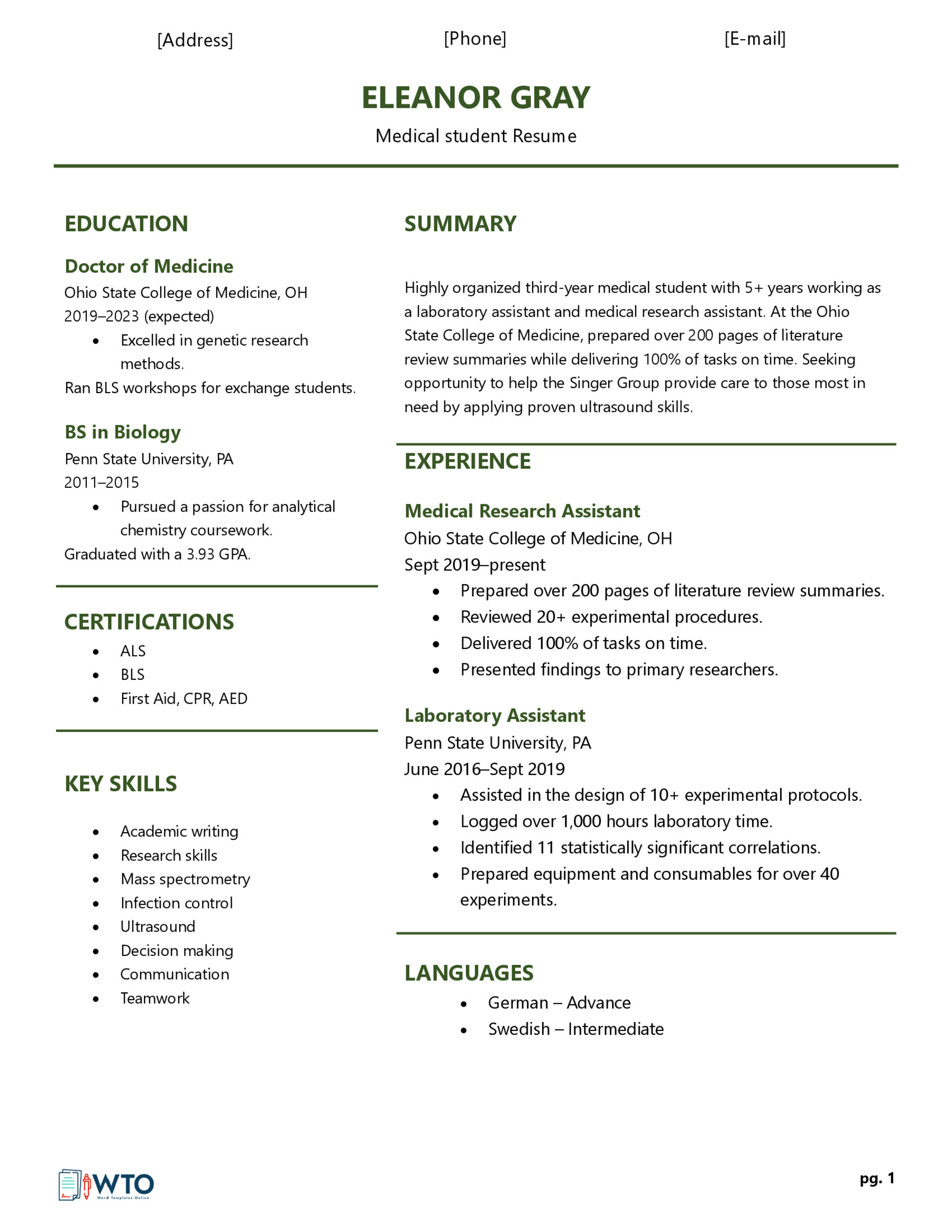
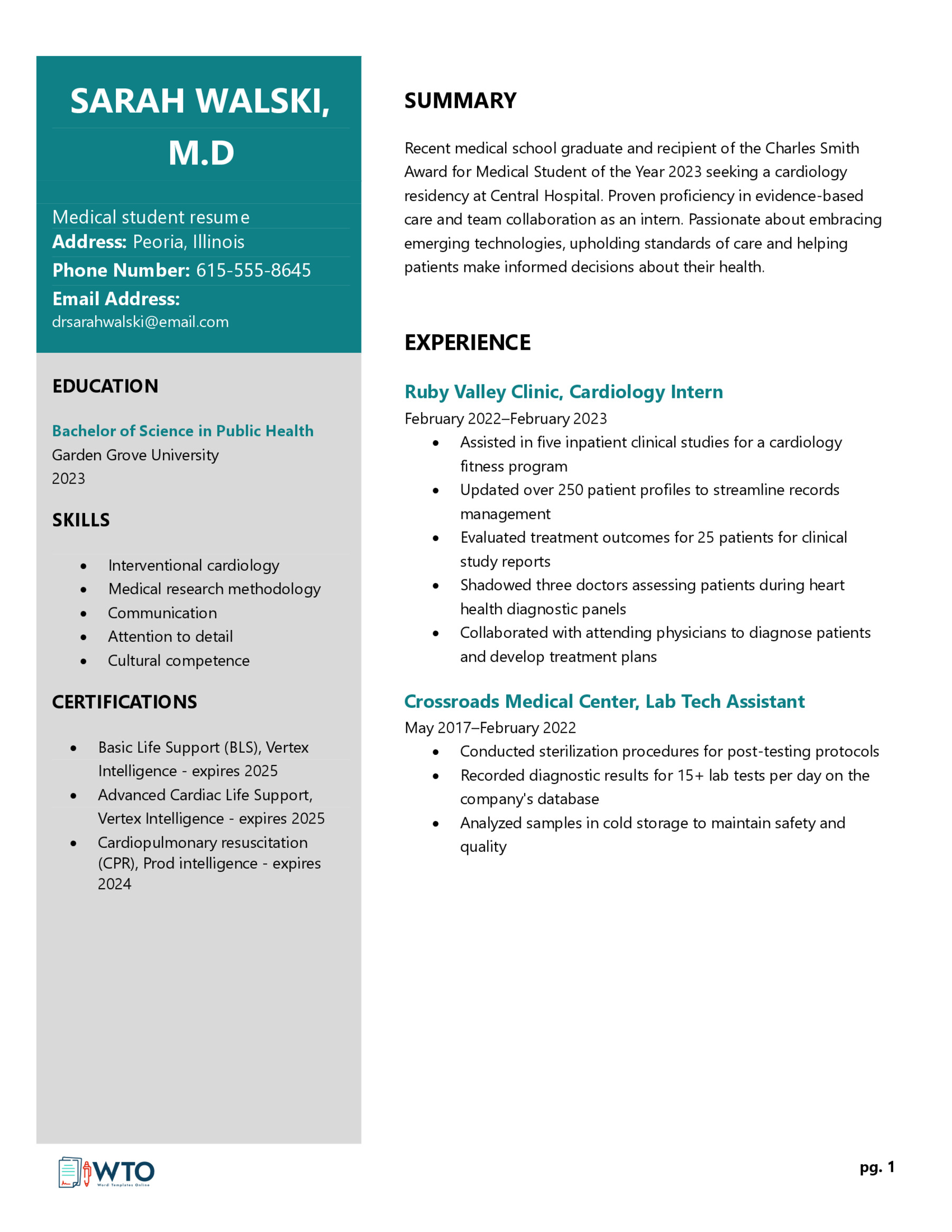
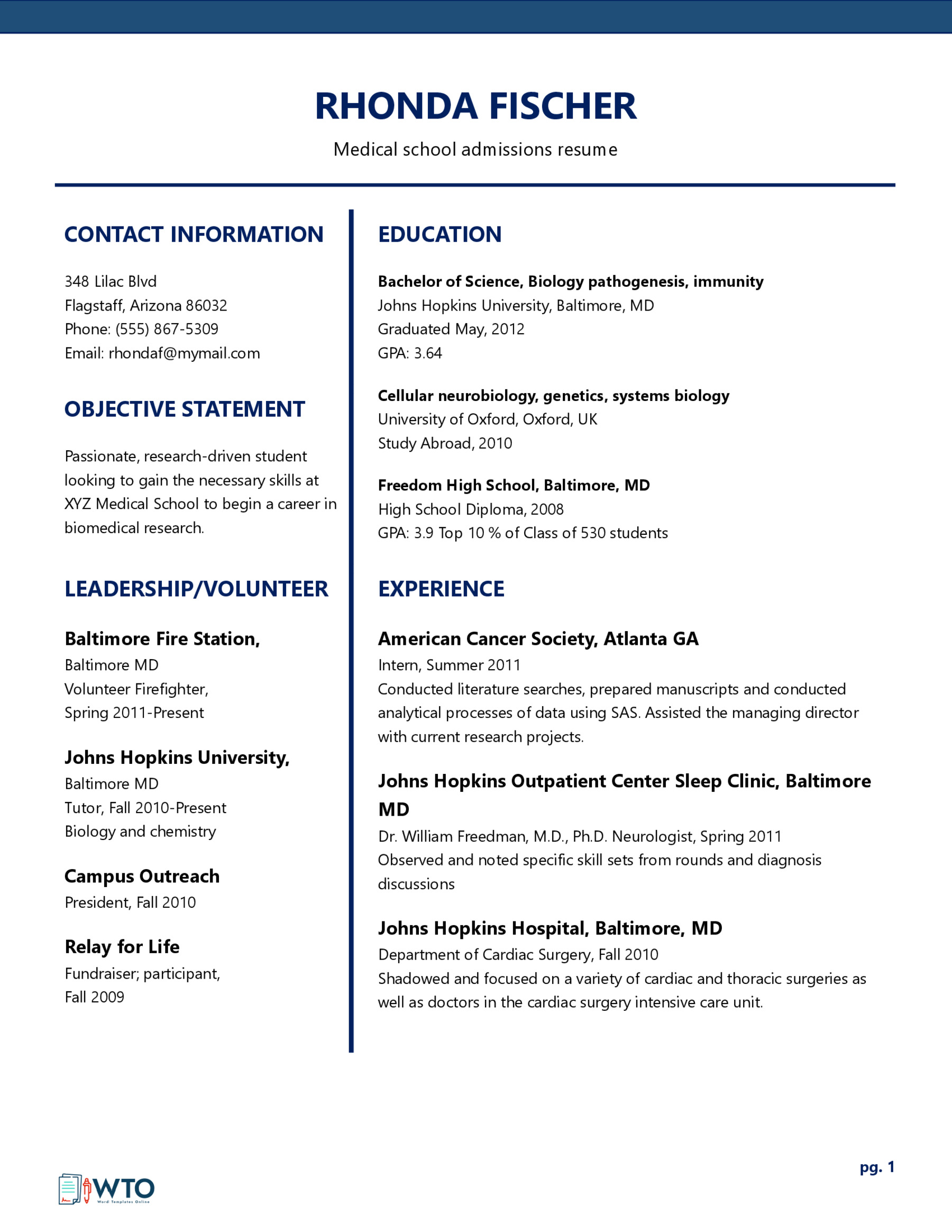
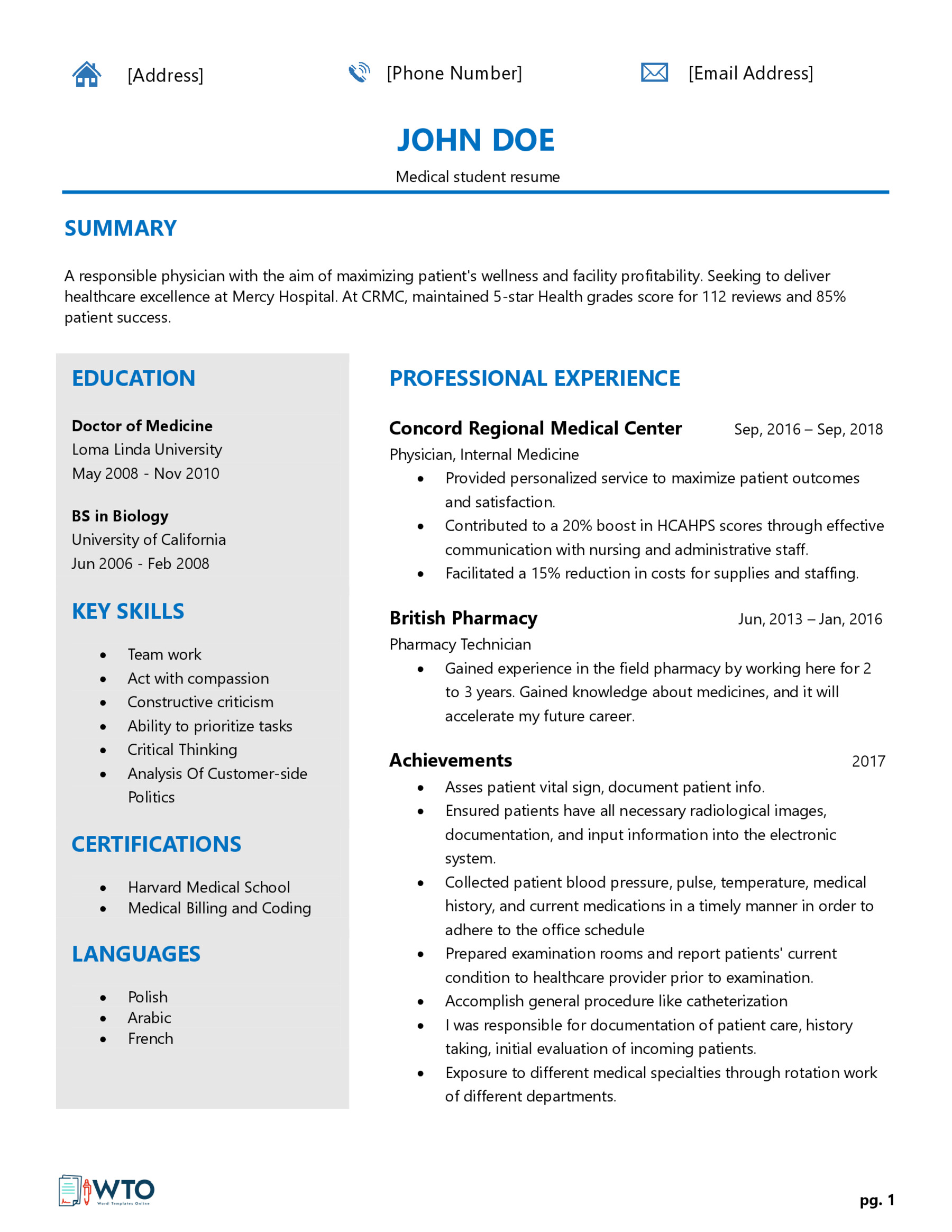
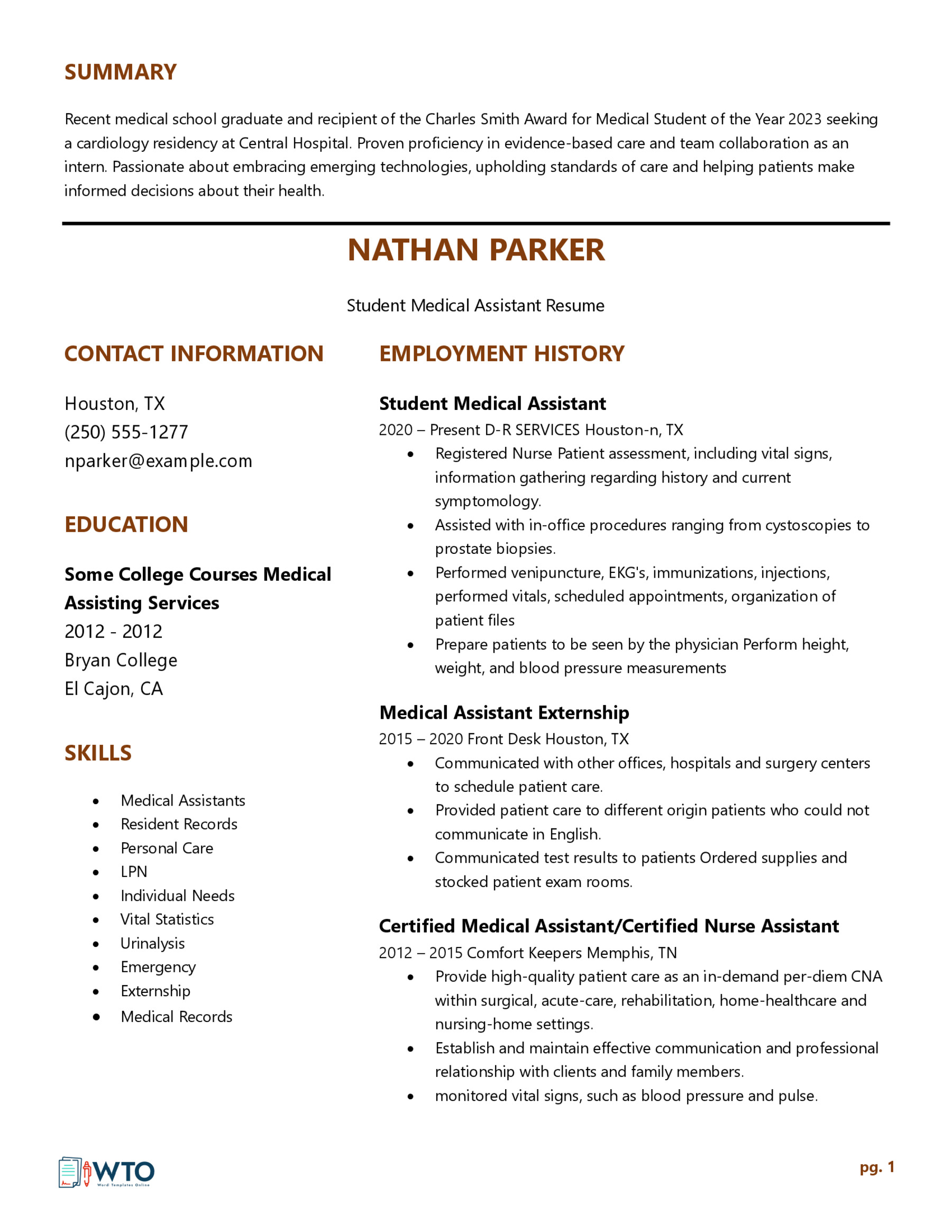
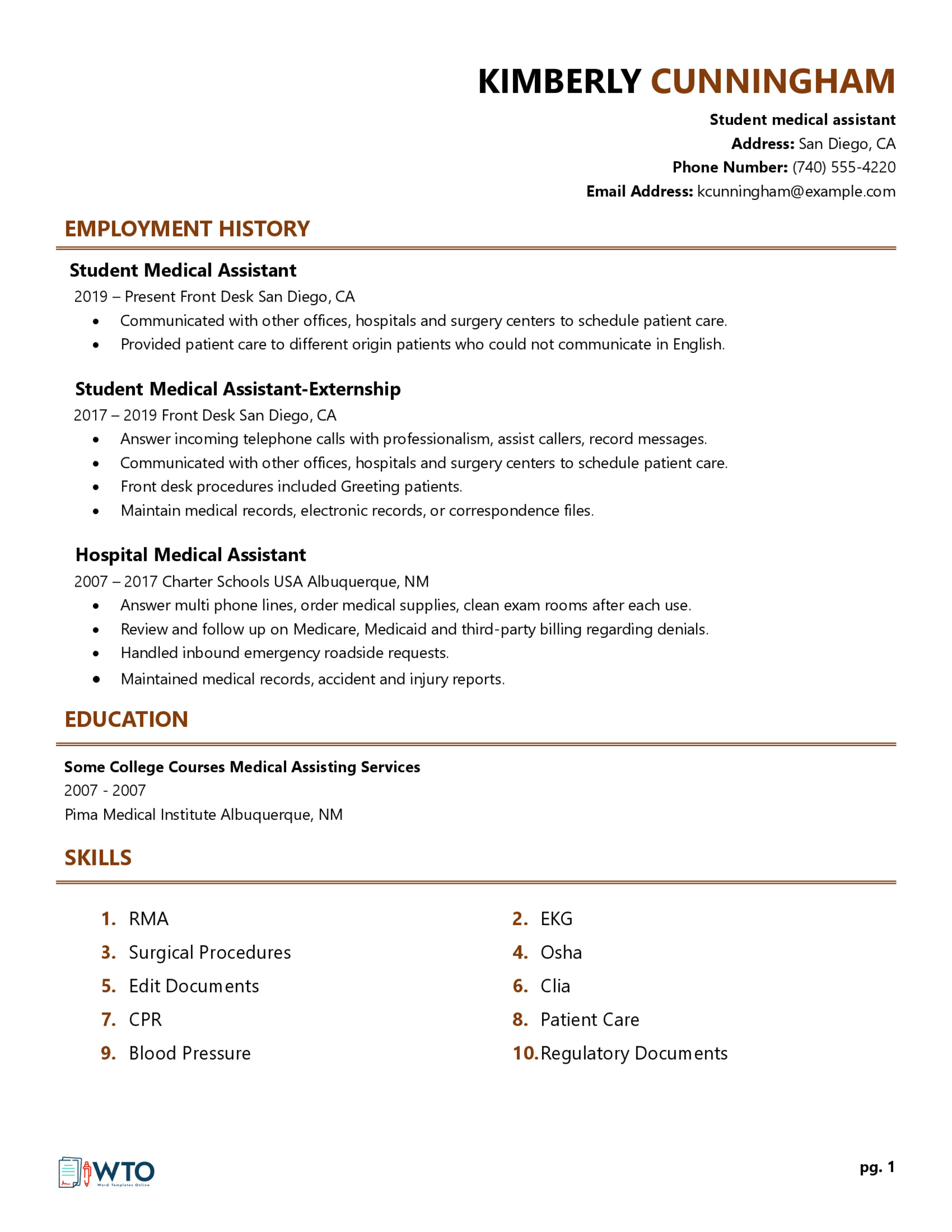
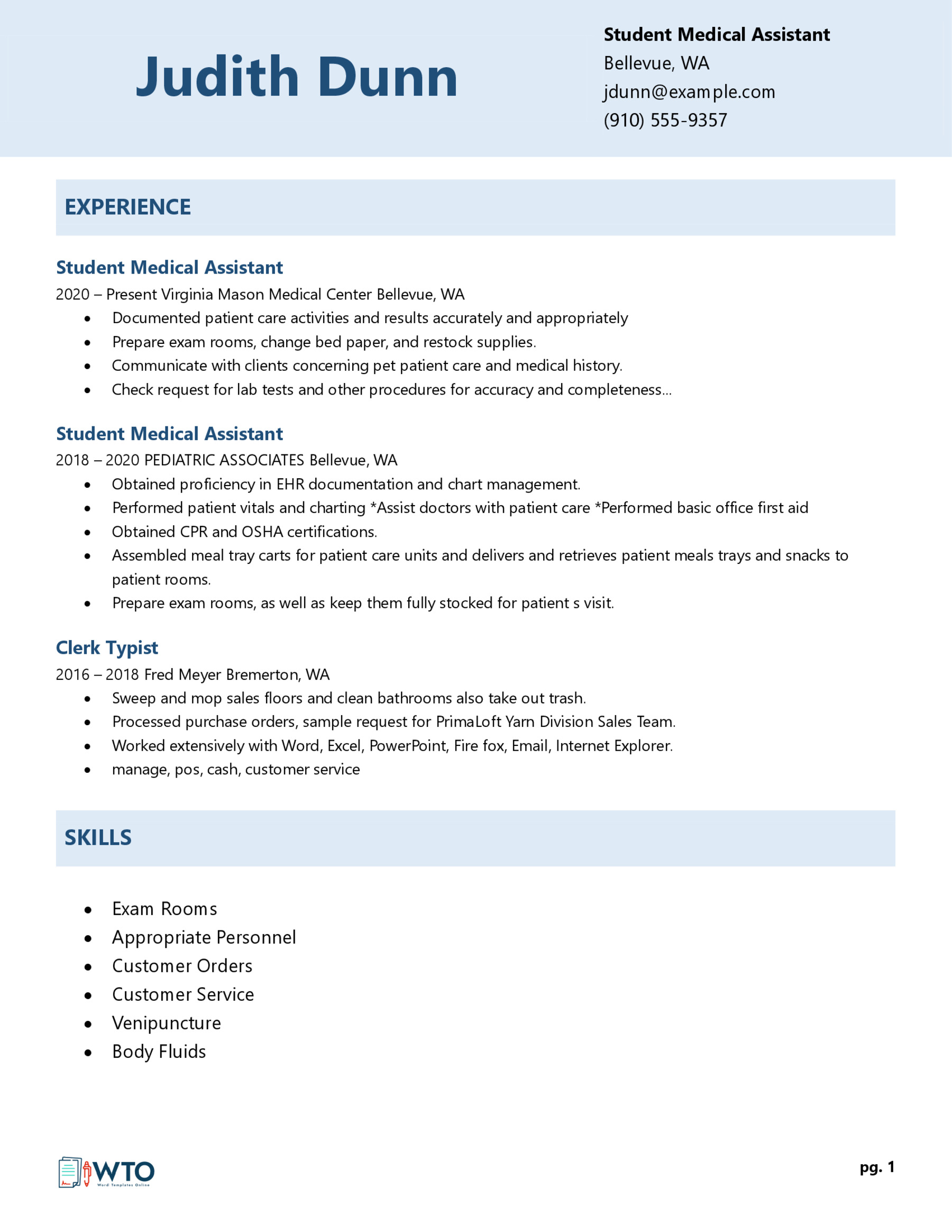
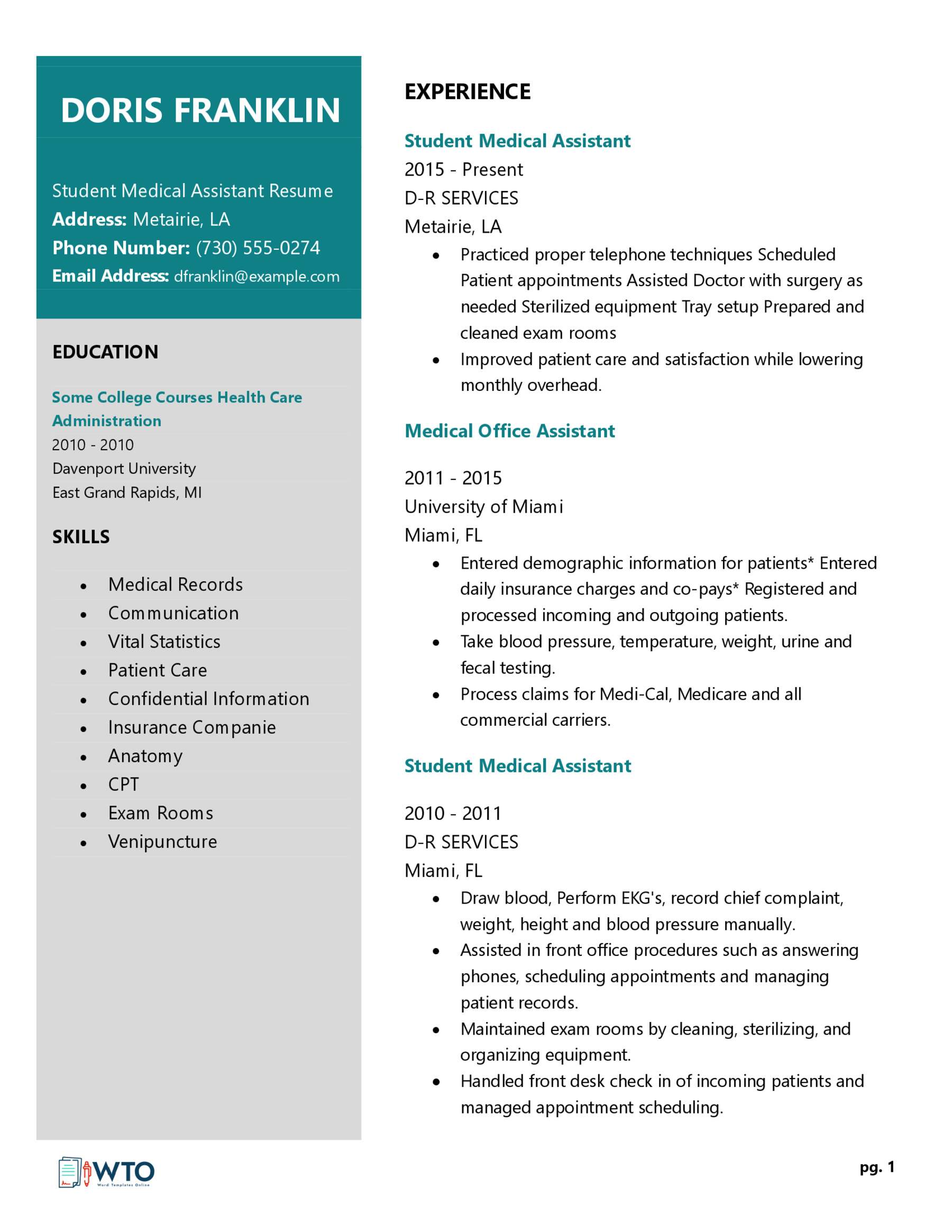
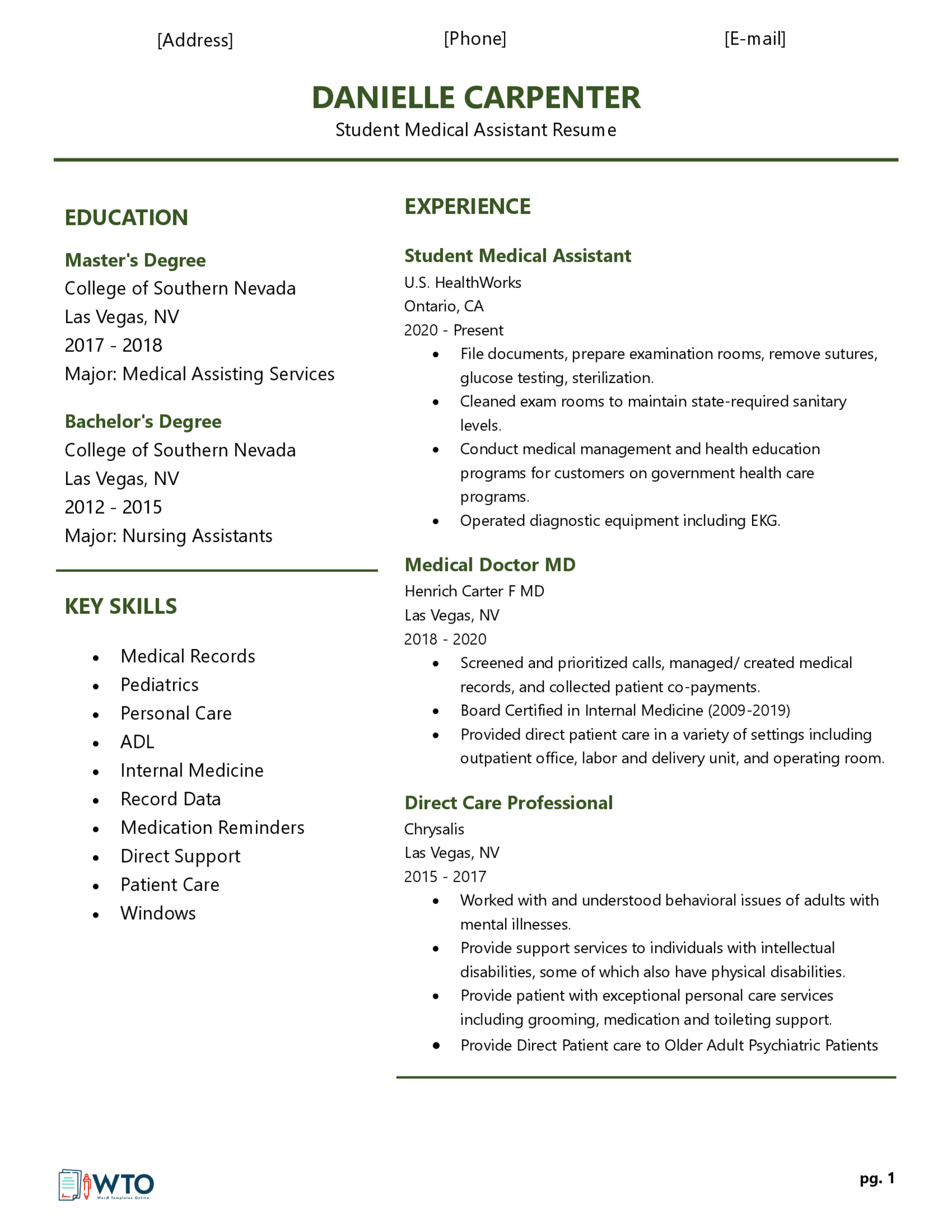
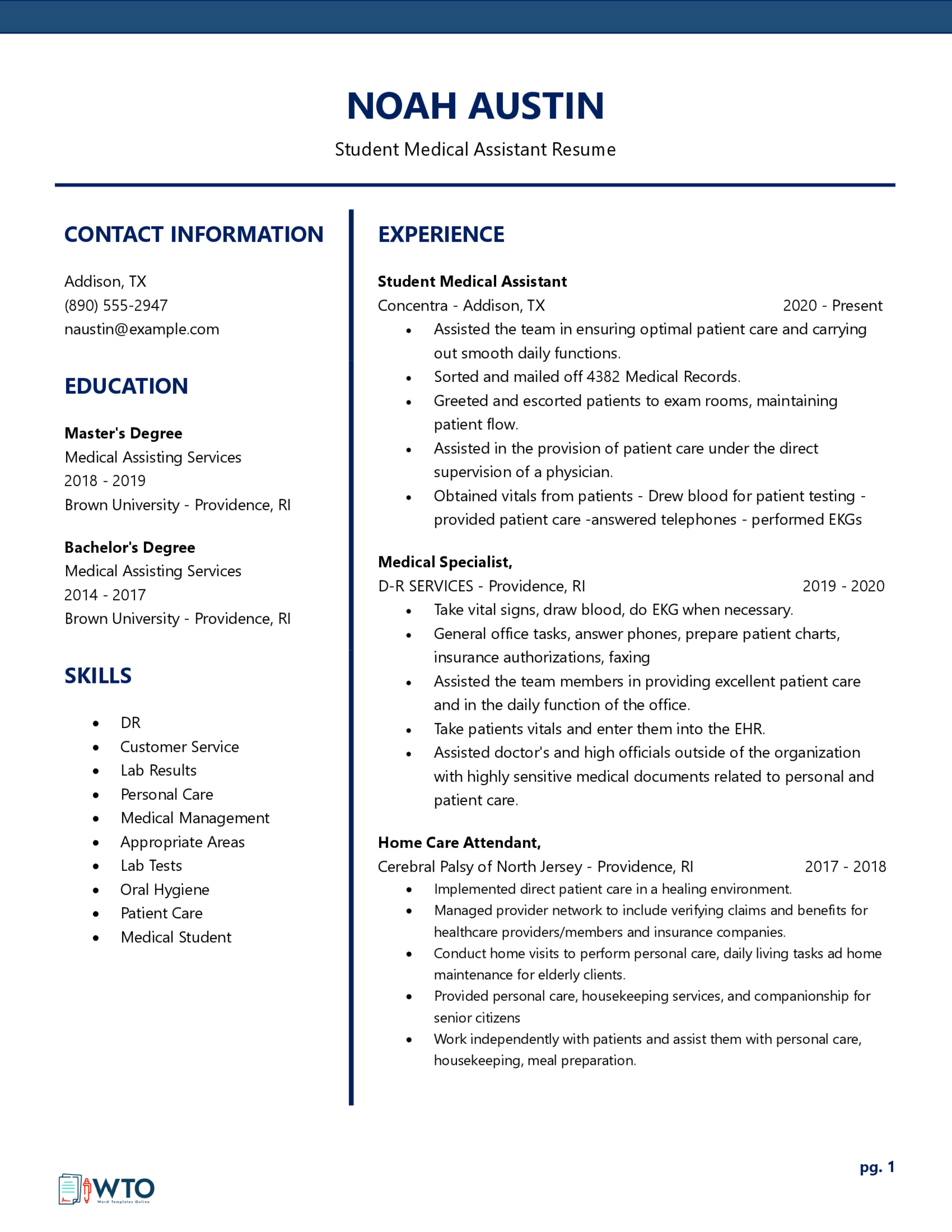
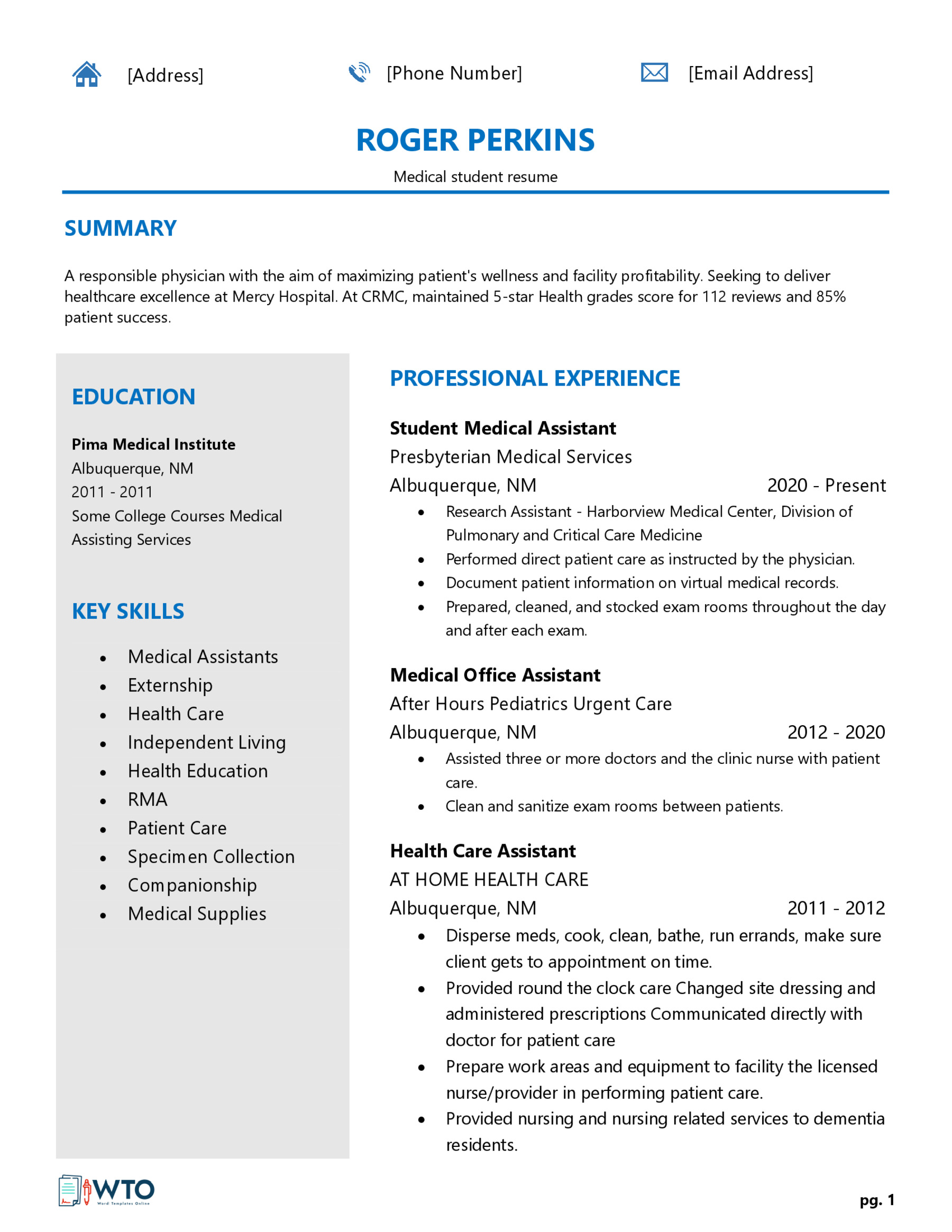
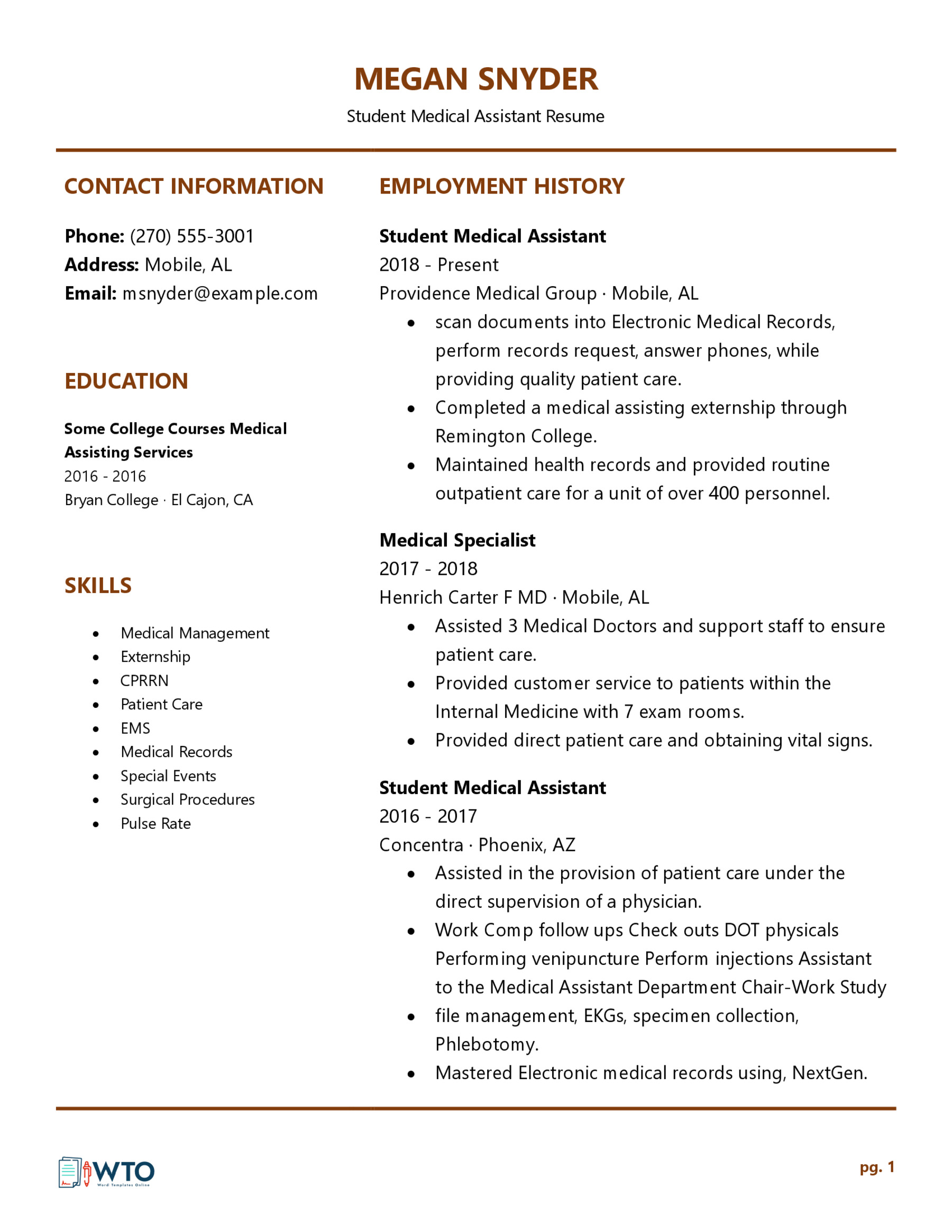
Tips to Make Your Medical Student Resume Stand Out
As a medical student, you have a lot of information that you can include on your resume. However, ensuring that your resume stands out from the rest is important.
Here are some tips to make your medical student resume stand out:
Start with a template
The best way to start is with a resume template. This will give you a solid foundation to build your unique resume. Plenty of templates are available online, so take some time to explore your options and find one that suits your needs. Once you have a template, you can start filling in your information.
Arrange sections according to priority
When creating a resume as a medical student, it is important to arrange the sections of your resume in order of priority. The most important section of your medical student resume is your education section, followed by your clinical experience section. Other sections, such as research experience or volunteer work and personal statement, can be included but should be placed below these two sections.
Stay away from generics
When it comes to your resume, medical students need to remember that generic just won’t cut it. Most students have similar coursework and extracurriculars, so a generic resume will not help you stand out. Rather, focus on what makes you unique and use that to your advantage.
Highlight your current scores
Include your current scores to ensure your medical student resume is as strong as it can be. This will show residency programs that you are dedicated to your studies and that you are capable of succeeding in their program. A high MCAT score can be the most important factor in your resume. The average score for admitted students is 30, while competing medical schools typically rank between 33 and 36.
Key Takeaways
- A medical student resume is an important document that summarizes your academic achievements and clinical experience.
- When applying for residency programs, it’s important to tailor your resume to each one. This means customizing your experience and skills section to match the requirements of each program.
- Always write your medical student resume in reverse chronological format, starting from your most recent position, degree, or program of study.
- Highlight your academic achievements. Your academic record is one of your strongest selling points as a medical student. Be sure to list any relevant honors or awards you’ve received and your GPA.
- Your resume should look clean and organized. Therefore, avoid using any fancy fonts or graphics. Use a generally accepted font such as times new roman, and use clear headings and bullet points to organize your information.
- List any experience you have in the medical field, including clinical rotations, research experience, and volunteering. If you have any relevant non-medical experience (such as customer service or leadership), you can also include that.
- List any relevant skills to the position you’re applying for (such as foreign language fluency or computer skills). You can also include any professional licenses or certifications you have.








